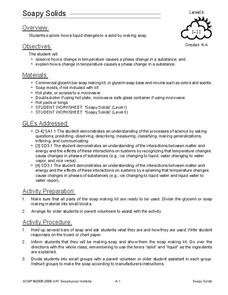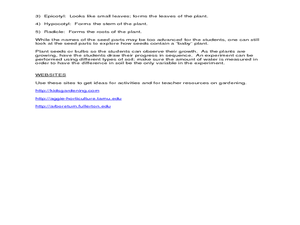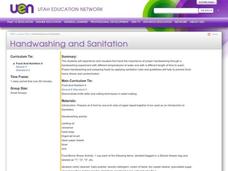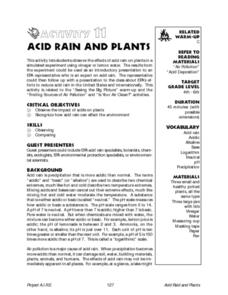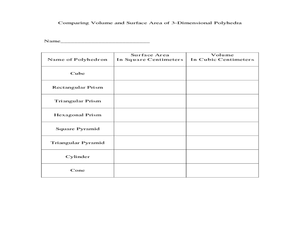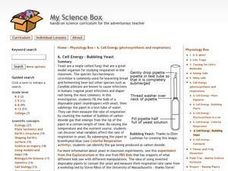Curated OER
Calorimetry
Students investigate calorimetry and set up equipment to measure calories. In this calorimetry lesson plan, students make a calorimeter and compare large amounts of heated water with small amounts to show the difference in calories....
Curated OER
DEW POINT
Fourth graders investigate conditions causing saturation and measure the dew point of the atmosphere performing simple experiments.
Curated OER
The Energy Debate - Energy of Peanut
Learners articulate the difference between the terms heat and temperature. They calculate the amount of energy associated with a given temperature rise and design an experiment to measure the energy of a fuel.
Curated OER
Chemistry Is a Gas
Students investigate the gas laws and how they apply to changes in gases. In this gas laws lesson, students use Boyle's Law and Charles' law to show the relationships between pressure and volume and volume and temperature of gases.
Curated OER
Soapy Solids
Young scholars observe and explain how a change in temperature causes a physical change in a substance. In this physical science lesson plan, students use a soap making kit to observe the effects of adding heat to the bar soap as they...
Curated OER
Food Energy
In this food energy worksheet, students review calories and how calories are determined. Students calculate how much thermal energy it would take to raise certain volumes of water a certain number of degrees. This worksheet has 3 word...
Curated OER
Frost Depth
Learners explore the concept of frost depth. In this frost depth lesson, students conduct a scientific investigation that requires them to use a frost tube to measure, record, and graph frost depth data.
Curated OER
Under Pressure
For this pressure worksheet, students read about Dalton's Law of Partial Pressure, about vapor pressure and about collecting gases over water. They answer 6 questions using the concepts of Dalton's Law of Partial Pressure and they solve...
Discovery Science Center
Kindergarten Observing, Comparing and Contrasting
Although this is a science lesson, it can be adapted to help meet Common Core standards in math as well. Starting scientists describe physical properties of objects and explore three forms of water. To address the Common Core, they can...
Curated OER
Handwashing and Sanitation
Students experience and visualize first hand the importance of proper hand washing through a hand washing experiment with different temperatures of water and with a different length of time to wash. They prevent food-borne illness and...
Curated OER
Acid Rain And Plants
Students observe the effects of acid rain on plants. They simulate an experiment using vinegar or lemon water. They observe the impact of acids on plants and recognize how acid rain can affect the environment. They examine their plants...
Curated OER
Cooking Cranberry Pudding
Young scholars explore colonial cooking. In this cross curriculum George Washington and colonial America history lesson, students follow a recipe for cranberry pudding, a possible favorite of George and Martha Washington. Young scholars...
Curated OER
The Value of Volume
Students measure the perimeter and area of their polygons. In this geometry instructional activity, students calculate the volume and area using the correct tools. They calculate the time and temperature and the perimeter and side...
Curated OER
Cell Energy - Bubbling Yeast
Students identify that yeast are a single celled fungi that are a great model organism for studying respiration in the classroom. They also fill the bulb of a disposable pipet (eyedropper) with yeast, then submerge the pipet in a test...
Curated OER
Air Pressure and Wind
In this air pressure and wind activity, students answer fifteen questions about how air pressure is measured, what it is, the reasons for changes in air pressure and the weather as air pressure changes. They also answer questions about...
Curated OER
How Oceans Affect Climate
Learners draw conclusions about how the ocean affects temperature. In this weather lesson, students use the Internet to gather data to help them come to a conclusion about how the climate in a certain region is directly affected by the...
Curated OER
Sewer Lice
High schoolers observe demonstrations that show adhesion, cohesion, equilibrium density, pressure of gases and solubility. In this gases lesson plan, students observe a demonstration of raisins, spaghetti, and popcorn moving up and down...
Curated OER
Graphing and Analyzing Biome Data
Students explore biome data. In this world geography and weather data analysis lesson, students record data about weather conditions in North Carolina, Las Vegas, and Brazil. Students convert Fahrenheit degrees to Celsius degrees and use...
Curated OER
Antacid Tablet Race
Students compare the reaction rates of effervescent antacid tablets under different conditions. They investigate methods of increasing the power of rocket fuels by manipulating surface area and temperature.
Curated OER
What Makes a Habitable Planet?
Students list conditions necessary for humans to survive. They then mix yeast with a nutrient broth consisting of warm water and table sugar in a plastic bottle, capping it with a party balloon and compare the factors within the bottle...
Curated OER
Classification of Matter
In this classification of matter worksheet, students answer 15 questions about solids, liquids and gases, types of mixtures and compounds vs. elements. They also answer 2 questions about measurement and 1 question about a biome.
Curated OER
Jackie Gore
Students identify the amount of heat given off by solar energy. In this solar energy lesson, students complete an experiment using soil and sand measuring the heat from solar energy.
Curated OER
Photosynthesis
Students investigate photosynthesis in water plants. In this photosynthesis lesson plan, students use the elodea plant and observe gas bubbles released to determine the rate of photosynthesis. They vary the light intensity and the amount...
Curated OER
Air Pressure & Barometers
Fourth graders observe, measure, and record data on the basic elements of weather over a period of time (i.e., precipitation, air temperature, wind speed and direction, and air pressure). Then, they make a barometer and keep record of...






